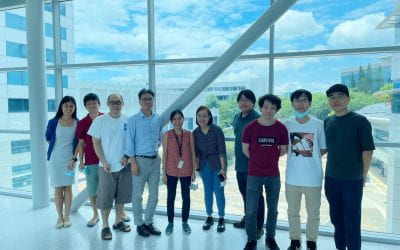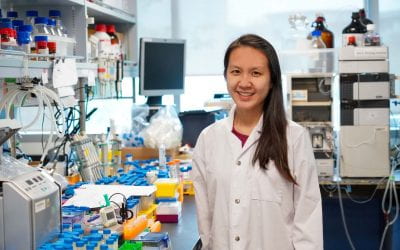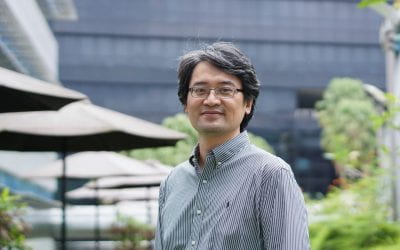As part of the Meet Our Students series, we connected with undergraduates from the school’s seven different programmes to learn about their motivations behind joining the programme, their experiences here at NTU SBS and more. Here’s Zac, currently pursuing the Bachelor of Science in Biological Sciences programme.
2nd in ST Logistics Innovation Challenge – Congratulations Team JSNCE! (SBS)
A team of undergraduates from NTU School of Biological Sciences (SBS) with Double Major in Biomedical Sciences and BioBusiness (BsB) took part in a case-competition to help hospitals reduce wastage of high-cost drugs. Their solution came in 2nd place in the ST Logistics Innovation Challenge 2021!
Nanyang Outstanding Young Alumni Award Recipient: Chow Chung Ping (SBS)
Mr Chow Chung Ping, one of the proud and deserving recipients of the Nanyang Outstanding Young Alumni Award this year, graduated from NTU School of Biological Sciences (SBS) in 2010 with a Minor in Business. He is now the Managing Director of Genedata. Congratulations!
Retrofitting Sheds Light on Biosynthesis of Anticancer Compound
A team of scientists, led by NTU School of Biological Sciences Prof Liang Zhao Xun, have demonstrated how the study on a family of recently discovered microbial metabolite, sungeidines, yielded unprecedented insights into the biosynthetic steps leading to the formation of anthraquinone-fused enediynes (AQEs)’ structure. The knowledge on the biosynthesis of AQEs will enable scientists to engineer the biosynthetic pathway to generate more potent and less toxic AQE derivatives for targeted cancer therapies.
Global Undergraduate Awards 2021: Leong Kye Siong from NTU SBS
Congratulations to Leong Kye Siong, a Year 4 undergraduate pursuing a double degree Bachelor of Science in Biomedical Sciences and Bachelor of Chinese Medicine at NTU School of Biological Sciences (SBS) who has been recognized by the Global Undergraduate Awards (UA) 2021!
Meet the CoS Valedictorians: Stella Ferdinand (SBS)
In this series, Science@NTU gets to know the 2021 CoS valedictorians! They give a quick overview of their time in CoS, and also offer a few words of advice on staying positive during these uncertain times. Next, we have Stella Ferdinand from the School of Biological...
URECA Undergraduate Research Excellence Awardee: Kon Wen Xuan from NTU SBS
Congratulations Kon Wen Xuan for receiving the URECA Undergraduate Research Excellence Award! Passionate in promoting the effectiveness in Traditional Chinese Medicine (TCM) practices, he embarked on a URECA project utilising data science to understand the diagnostics of TCM.
Plant Organs Evolve by Reusing Old Genes
Have you ever wondered how plant organs have evolved over the hundreds and millions of years? Land plants evolved from a group of green algae as early as 470 million years ago and all thanks to their evolution, the Earth is beautifully colonized with plants of different species.
Congratulations Dr Loo Shining on being selected as a Mistletoe Research Fellow!
Identified by the Mistletoe Research Fellowship (MRF) Reward Committee for her “collaborative spirit, intellectual curiosity, and resiliency”, Dr Loo Shining has been selected as a Mistletoe Research Fellow for the 2021-2022 cycle.
Congratulations to Associate Professor Miao Yansong on receiving the Graduate Mentoring Award!
Our warmest congratulations to Associate Professor Miao Yansong from the School of Biological Sciences, on receiving a special mention for the Graduate Mentoring Award for AY2020-21 at NTU’s Graduate College Award!










